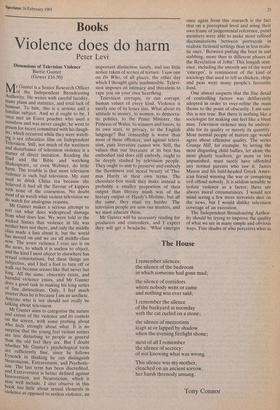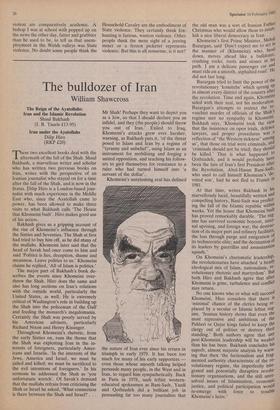Books
Violence does do harm
Peter Levi
Dimensions of Television Violence Barrie Gunter (Gower £16.50)
Mr Gunter is a Senior Research Officer of the Independent Broadcasting Authority. He writes with careful lucidity, many plans and statistics, and total lack of humour. To him, this is a serious and a familiar subject. And so it ought to be. I once met an Essex poacher who used a crossbow and was never caught; he went to Prison for incest committed with his daugh- ter, which occurred while they were watch- ing a sex education film on Independent Television. Still, not much of the nastiness and disturbance of television violence is a matter of direct imitation. Reading the Iliad and the Bible and watching Shakespeare, or even Webster, do little harm. The trouble is that most television violence is such bad television. My aunt used to drink China tea because she believed it had all the flavour of kippers with hone of the coarseness. No doubt most of us watch what violent television we do watch for analogous reasons.
Mr Gunter makes a serious attempt to son out what does widespread damage from what does less. We were told in the wicked Sixties that violence in life was neither here nor there, and only the middle class made a fuss about it, but the world has moved on and we are all middle-class now. The worst violence I ever see is on the news, to which it is useless to object, and the kind I most object to elsewhere has sexual connotations, but these things are subjective, and I feel a fool to turn off or walk out because scenes like that never last long. All the same, obscenity exists, and harmful violence exists, and Mr Gunter does a good task in making his long series of fine distinctions. Only, I feel much stricter than he is because I am an aesthete. Anyone who is not should not really be talking about television. Mr Gunter aims to categorise the nature and extent of the violence and its context on the screen, with some probing about who feels strongly about what. It is no surprise that the young feel violent scenes are less disturbing to people in general than the old feel they are. But I doubt whether Mr Gunter's psychological tools are sufficiently fine, since he follows Eysenck in thinking he can distinguish Neuroticism, Extraversion, and Psychotic- The last term has been discredited, and Extraversion is better defined against Introversion, not Neuroticism, which it may well include. I also observe in this book too little about sexual elements in violence as opposed to sexless violence, an
important distinction surely, and too little notice taken of scenes of torture. I saw one on Dr Who, of all places, the other day which I thought quite inadmissible. Televi- sion imposes an intimacy and threatens to rape you on your own hearthrug.
Television corrupts, or can corrupt, human values of every kind. Violence is surely one of its lesser sins. What about its attitude to money, to women, to democra- tic politics, to the Prime Minister, the Princess of Wales, to winners and losers, to its own stars, to privacy, to the English language? But censorship is worse than most of these offences, and against televi- sion, pure literature cannot win. Still, the values that our literature at its best has embodied and does still embody, ought to be deeply studied by television people. They ought to aim to preserve and embody the thorniness and moral beauty of Tho- mas Hardy in their own terms. The chocolate-box mush they make instead is probably a smaller proportion of their output than literary mush was of the literary output of Hardy's lifetime, but all the same, they must try harder. The television people are now our masters, and we must educate them.
Mr Gunter will be necessary reading for producers and controllers, and I expect they will get a headache. 'What emerges once again from this research is the fact that on a perceptual level and using their own frame of judgemental reference, panel members were able to make more refined discriminations between portrayals in realistic fictional settings than in less realis- tic ones.' Between putting the boot in and stabbing, more than in different phases of the Revelation of John? This longish sent- ence, including the smooth use of the word 'emerges', is reminiscent of the kind of sociology that used to tell us chicken, chips and peas were many people's favourite food.
One almost suspects that the fine detail of controlling factors was deliberately adopted in order to over-refine the main theme to the point of obscurity. I am sure this is not true. But there is nothing like a sociologist for making one feel like a blunt man. Television violence may be undesir- able for its quality or merely its quantity. Most normal people of mature age would agree about offensive quality. The series Grange Hill, for example, by letting the most disgusting child bullies, let alone the most ghastly teachers, go more or less unpunished, must surely have offended any normal parents who saw it. James Mason and his bald-headed Greek Amer- ican• friend winning the war or conspiring evil offend nobody. It is seldom sensible to isolate violence as a factor; there are always moral circumstances. I would not mind seeing a few more terrorists shot on the news, but I would dislike television coverage of an execution.
The Independent Broadcasting Author- ity should be trying to improve the quality of what we see in many simple and obvious ways. Fine shades of who perceives what as violent are comparatively academic. A bishop I was at school with popped up on the news the other day, fatter and grubbier than he used to be, to tell us that unem- ployment in the Welsh valleys was State violence. No doubt some people think the Household Cavalry are the embodiment of State violence. They certainly think fox- hunting is furious, wanton violence. Other people think the mere sight of a jeering miner or a frozen picketer represents violence. But this is all nonsense, is it not?















































 Previous page
Previous page